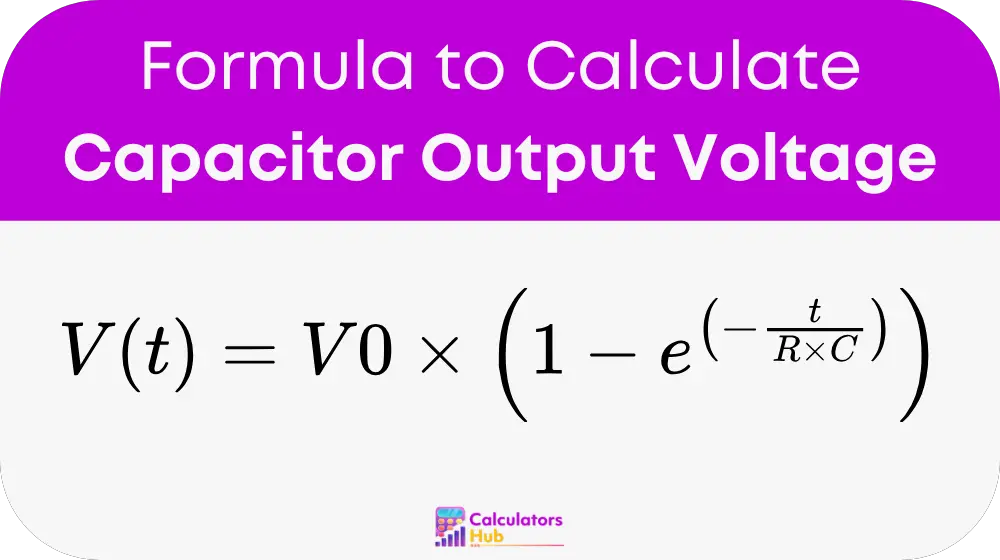A capacitor output voltage calculator is a useful tool designed to determine the voltage across a capacitor during the charging process in an RC (resistor-capacitor) circuit. When a capacitor is charged through a resistor, the voltage across the capacitor increases over time, following a predictable pattern. Understanding this behavior is crucial in electrical engineering, as it helps in designing circuits, timing devices, and filters.
The calculator simplifies the task by providing a quick method to calculate the voltage at any given time during the charging process. This can be especially useful for determining how long it will take for the capacitor to reach a certain voltage level or how much voltage will be across the capacitor at a specific moment.
The calculator typically takes into account the supply voltage, resistance, and capacitance to provide an accurate voltage output over time.
Formula of Capacitor Output Voltage Calculator
The output voltage of a capacitor in an RC charging circuit can be calculated using the following formula:

Where:
- V(t) = Voltage across the capacitor at time t (in volts)
- V0 = Supply voltage (in volts)
- t = Time (in seconds)
- R = Resistance (in ohms)
- C = Capacitance (in farads)
- e = Euler’s number (approximately 2.718)
This formula describes the exponential nature of the charging process, where the voltage across the capacitor starts at zero and asymptotically approaches the supply voltage over time. The time constant (τ), which is the product of resistance (R) and capacitance (C), determines how quickly the capacitor charges.
Common Terms and Quick Lookup Table
To help users quickly assess common values without recalculating each time, here’s a table showing approximate capacitor voltages for a range of common time constants (τ = R * C). These values are based on specific moments during the charging process.
| Time (t) / Time Constant (τ) | Percentage of Full Charge (V(t)/V0) | Voltage (V) at V0 = 5V |
|---|---|---|
| t = 0.5τ | 39.3% | 1.97V |
| t = 1τ | 63.2% | 3.16V |
| t = 2τ | 86.5% | 4.33V |
| t = 3τ | 95% | 4.75V |
| t = 4τ | 98.2% | 4.91V |
| t = 5τ | 99.3% | 4.97V |
The table above illustrates the typical voltage values for a capacitor charging in an RC circuit. It shows how quickly the voltage approaches the supply voltage and can be used for quick reference instead of manually performing calculations each time.
Example of Capacitor Output Voltage Calculator
Let’s work through an example to better understand how the capacitor output voltage calculator works.
Problem:
You have an RC circuit with a 10V supply voltage (V0), a resistance of 2 kΩ (R), and a capacitance of 470 µF (C). You want to calculate the voltage across the capacitor after 3 seconds (t).
Solution:
- Convert values into appropriate units:
- R = 2000 ohms
- C = 470 * 10^-6 farads (0.00047F)
- t = 3 seconds
- V0 = 10V
- Calculate the time constant (τ):
- τ = R * C = 2000 * 0.00047 = 0.94 seconds
- Apply the formula for capacitor voltage:
- V(t) = V0 * (1 - e^(-t / (R * C)))
- V(3) = 10 * (1 - e^(-3 / 0.94))
- V(3) ≈ 10 * (1 - e^(-3.19))
- V(3) ≈ 10 * (1 - 0.041)
- V(3) ≈ 10 * 0.959
- V(3) ≈ 9.59V
Answer:
After 3 seconds, the voltage across the capacitor is approximately 9.59V.
Most Common FAQs
In an RC circuit, a capacitor never fully charges in the strict sense. However, it is generally considered to be "fully charged" after 5 time constants (5τ), at which point the capacitor has reached over 99% of the supply voltage.
The time constant τ, defined as the product of resistance (R) and capacitance (C), is a critical value that determines how quickly a capacitor charges. After one time constant, the capacitor will have charged to approximately 63.2% of the supply voltage.
No, the formula and calculator described here are specifically for capacitors in charging circuits. For discharging circuits, a different formula is used, which describes the exponential decay of voltage over time. You can use similar tools for capacitor discharge calculations.